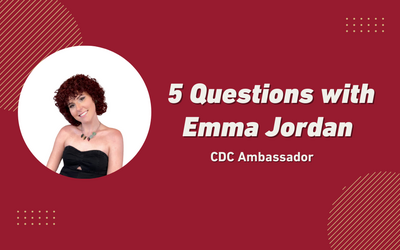
After years of being a medical mystery, Chronic Disease Coalition (CDC) Ambassador Emma Jordan was diagnosed with Ehlers-Danlos syndrome along with gastroparesis, celiac disease, irritable bowel syndrome (IBS) and more. IBS affects up to 10-15% of people worldwide, with higher rates in women, particularly during their reproductive years. Emma recently sat down with the CDC to share her experience.
IBS is a secondary diagnosis for you, but can you share how you were diagnosed?
Having other stomach issues, it was hard to narrow down my symptoms. I found a great doctor who was able to identify my IBS symptoms and identify symptoms that turned out to be endometriosis. Other doctors I had seen weren’t able to look beyond their specialty to figure out what was causing my symptoms.
Access to care and treatment is so important for people with IBS and other chronic diseases – can you share some of the challenges you have faced?
Step therapy and prior authorization have been the biggest challenges. Step therapy is often called fail first and the name alone is telling – having to fail on a treatment my doctor and I already know doesn’t work just leads to prolonged suffering and pain. Recently, I needed an expensive antibiotic from a specialty pharmacy that required several prior authorizations. I had to fight with my insurance company for months to get approval. While I was waiting, I wasn’t eating and was losing weight. Even my doctor was frustrated because we both know this antibiotic works best for me.
How have your chronic diseases motivated you to help others?
Advocacy wasn’t on my radar until I started having chronic health issues and was trying to figure everything out. When my health issues caused me to withdraw from college, I started looking for things that would help me discover a purpose again and bring me fulfillment; advocacy really helped me with that. The CDC has been so helpful giving me advocacy tools and teaching me how to use them.
What’s one thing you wish people without chronic diseases knew about you and your experience?
I wish people knew that it (chronic disease) never goes away. When someone says they wish you felt better, the sentiment is appreciated, but chronic means forever and that’s probably the hardest thing to deal with.
Have you ever reached a point where you felt like giving up? What helps keep you going?
The online disability community has helped keep me going multiple times. It has allowed me to commiserate and talk but also be a shoulder to cry on for others. Living with a chronic illness and advocating is not always easy, but it is so worthwhile. There is disabled joy and pride in everyday events, even when it’s hard to see it yourself.
April is IBS Awareness Month
Learn how you can spread awareness, break stigma and support those with IBS. Want to learn more about IBS? Check out this animated video series.